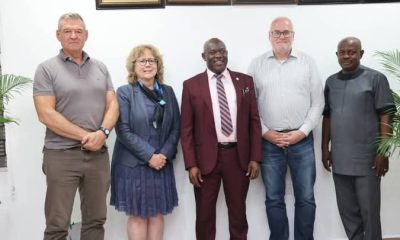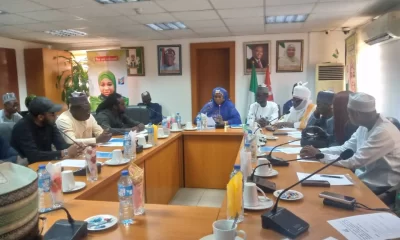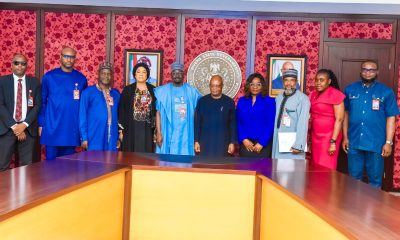Opinion
The Press As A Nation Builder (1)
Novelist Jeffrey Archer in
his work The Fourth Estate made the observation: “In May 1789, Louis XVI summoned to Versailles a full meeting of the ‘Esate General’. The first Estate consisted of three hundred clergy. The second Estate, three hundred nobles. The third Estate, six hundred commoners. Some years later, after the French revolution, Edmund Burke, looking up at the Press Gallery of the House of Commons, said, ‘Yonder sits the Fourth Estate, and they are more important than them all”.
The Fourth Estate, referred to above is the Press. The Press is a body of journalists who write for newspapers or magazines or prepare news or features to be broadcast on radio or television.
The Press has a wider access to the people, hence it has a very strong impact on the nation. It plays a vital role in the opinion making process of the country. Now that the world has become a global village, the Press has the power to turn our dreams into reality. It is the need of the hour that press should play its role in the nation building process. Instead of being indulged into the false propagation, media should try to optimize the situation.
These days, the term Press has grown from journalism as practised with the pen as any means by which journalism is practised. As such, we have the print media comprising all categories including newspapers, magazines and co, we have the electronic media whether it be radio, television, biog sites and the internet.
Looking through the ages, we see that the two major agents for social change and societal reforms have been the church and the press, both of them sometimes working hand in hand to cause such changes.
The invention of the movable type printing press by Johannes Gutenberg around 1493, ushered in a new era, kick-starting the European renaissance which eventually led to the industrial age. It is noteworthy that the printing press was borne out of research concerning the church and the first major use of the press was for printing of bibles.
The invention of the printing press allowed ideas to be shared, information to be stored and disseminated and empowered a new class of individuals who found an easy way to express themselves and speak to the wider audience beyond that possible by hand written pages. The impact of the printing press is so profound that till today we of the media are still being known as the “Press” over 400 years after.
The government of then, seeing the impact of the Press and the great influence over the people, sought to stifle the Press by gagging the most prescient members of the journalistic class. Men like Martin Luther, William Tyndale and co. had to pay the highest journalistic price. Dying for what they believed that the truth must be told.
Since then, there has existed a fragile relationship between the government of the day and the Press. The government attempting to harness the Press for it’s purposes and the Press seeking to express itself as a watchdog of the government and the nation.
The power of the Press to influence societal change and national direction has been and is greatly recognized by nations and this is why the press the world over is virtually the most controlled and regulated industry. The power of the press is so recognized that every great nation has a propaganda unit either to keep it’s citizen in check or to fool other nations.
An instructive flashback to the now collapsed Soviet Union shows that until the day of the collapse, the Soviets thought that their nation was the greatest in the world and was moving smoothly. Thanks to a well oiled propaganda machine frontlined by a government controlled Press. It is instructive that many people went into self denial and even committed suicide when faced with the harsh reality that they had always been fed a lie. The more totalitarian a nation, the more controlled the Press.
The Press is most beautiful in its role as the champion of national causes as evidenced during the era of the great depression in the US where the government rallied the media to create a new mindset for the American people, giving them a belief in themselves and pointing out areas and directions for entrepreneurial adventures.
We see that beauty in a fearless Press acting as the watchdog for the nation bringing down unpopular governments as witnessed during the Ibrahim Babangida and Sani Abacha years in Nigeria. We also saw that manifestation as the press almost single-handedly fought the third term agenda of the Olusegun Obasanjo government to a standstill.
In its role as watchdog, the Press should exercise a high degree of responsibility by seeking the national good above who breaks the news fast. There should also be a high degree of maturity and vetting to prevent national disasters and carnages.
Etiaba, a lawyer, writes from Port Harcourt.
Echezona Etiaba
Opinion
Kids Without Play Opportunities

“All work and no play”, its said, “makes Jack a dull boy.” Despite this age-long maxim that recognises the role of play in early childhood development, play appears to be eluding many Nigerian kids. The deprivation of play opportunities comes in different forms for the Nigerian child depending on family’s social setting or status, but the effect is much the same. For children in Nigerian poor families, life is becoming as much a hassle as it is for their struggling parents. Due to harsh economic conditions, many families resort to engaging their kids prematurely in trading activities especially in hawking, to help boost family revenues, when these kids should be enjoying leisure after school. Some of these children barely attend schools while being forced to spend much of their childhood hustling in the streets. For children from well-off families, time could be as crunchy as it is for their busy parents when, obsessed with setting agenda for the future of their kids, parents arrange stringent educational regiment too early for their kids.
These group of children are made to get-off the bed by 5.30am every weekday, get ready for private school buses that call at 6.00am, otherwise report by however means to school at 7.20am.The situation is worse for kids in the city of Lagos where the need to beat urban traffic rush-hours is very high. Most children are further subjected to extra hours of lessons after school at 2.00pm, only to be released with loads of homework. On many occasions children who leave home for school at 6.30am get back by 3.30pm. With hardly enough time to eat, do school assignments and take afternoon naps, these children hardly had time for plays before dinners. In Nigeria, kids of ages between 3 and 12 spend averages of 9 hours a day and 45 hours a week to and from schools, and additional hours doing home assignments and domestic jobs, whereas their peers in developed countries spend about half that duration and have more time for leisure.
Any remaining spare time left after school work or street hustle is further stolen, when kids who usually are fascinated by gadgets, are exposed to household electronics like phones, tablets and gaming consoles. Electronic games may create a sense of leisure, but the difference with human interactions is that kids doing games interface mostly with machines or with programme structured in ways that entrap a child’s pysch directionally, according to the game’s programming, in ways that may not encourage independent thinking. Moreso, attraction to such gadgets displaces kids’ attention from important television and radio programmes. The prevalent tight, academic schedules for some Nigerian kids, though intended for academic excellence, encroaches on childhood leisure time needed to achieve an all-round childhood development, and could make children to resent formal education altogether. Besides, academic excellence or economic pursuit, is not all there is to living a well-nurtured life.
Children’s leisure time, defined as time left over after sleeping, eating, personal hygiene and attending school or day-care, is very crucial to childhood development. Sociologists recommend that children should have at least 40 per ceny of the day as leisure. According to Berry Brazelton, a former pediatrician at Harvard Medical School, “Play is the most powerful way a child explores the world and learns about him or herself.” Unstructured play encourages independent thinking and allows the young to negotiate their relationships with their peers, and in the process build self-confidence and self-control. Play is one of the important ways in which young children gain essential knowledge and skills. Leisure time enhances learning as fun enables children to learn at their own level and pace. Young children naturally explore and learn many skills by making cognitive connections from events that catch their attention.
Unstructured plays help children developed their cognitive, physical and communication skills that make them acquire social qualities necessary in navigating relationships in adult life. Plays enable children assess how others feel and learn perspectives as well as empathy through observing differences in facial expressions, body language and even tone of voice, which helps them copy how to express themselves to others, and therefore develop socially acceptable behavours that build relationships. In cooperative activities, children willingly take things in turn and may delegate roles. Children can also share the glory of winnings through competitive games, which is all great for working together in task sharing. Aside encouraging parents to ensure adequate leisure time for their kids at home, schools should make plays and exercises an integral part of the educational curriculum. The educational curriculum set by the Nigerian Educational Research and Development Council (NERDC) includes specific training durations and break periods, as well as sporting activities, as part of the school system.
Due to poor government funding, sports in public schools have declined, while most private schools lack sporting infrastructure or even play grounds. These make recreational activities and sports implementation almost impossible in schools. Also, the increasing rate of urbanisation in Nigerian communities is gradually eroding ancient playgrounds, while established urban centres have lost community playgrounds. With tightening apartment spaces now being the norm in most urban residential areas, many kids are forced to wriggle within burglary-proof enclosures. Nigerian governments and the relevant agencies should ensure that existing child labour protection laws, educational and urban development codes are implemented in the country, to enable proper nurturing of children as the future stakeholders of our society. Private schools, especially, should be supervised to ensure they follow the educational curriculum standards set by NERDC.
In a bid to impress parents and draw more patronage as better option than public schools, private schools, most of whom operate in cramped environments, have continued to set high regiments of training schedules beyond the capacity of most kids, and even encourage enrollment of pre-school age kids who can not sit still to listen for an extended periods of time. Schools, from creche to secondary levels, without playgrounds and recreational facilities should not be allowed to operate, and should be made to understand and implement appropriate curriculum and training durations. Many Nigerian kids, whether from rich or poor families, appear to have been set-up inadvertently, in the same leisure denial that affects their parents. All work and no play could lead to some messed-up kids who grow up not understanding social cues, and being unemotional and self-centered, manifest later as obsessive-compulsive adults.
By: Joseph Nwankwo
Opinion
Congratulations Fubara, Joseph Of Rivers State

We thank God who is above all human contrivance and arrogance. Congratulations, Your Excellency Amaopusenibo Sir Siminalayi Joseph Fubara. Your victory takes us back to the Bible as a living document of a God that rules in the affairs of all His creation. In a manner of speaking, welcome back from your first war with Phillistines, Your Excellency! Yes, first example is David and Goliath! And like David, Your Excellency stands over Goliath in victory. But that is not enough. Our real enemy is that Your Excellency is Governor of a State with a wretched economy. Indigenes of Your State are today reduced to battalions of beggars waiting for who will hire their loyalty on the usual “pay-as-you-go” basis.
Your Excellency, it brings us to another Bible- based parallel. Conscientious Rivers indigenes above 50, should identify with and commit our all to this second parallel. It is to liberate the economy and people of Rivers people from 23 years enslavement and poverty, for us to regain our dignity and pride. When the economy of Egypt was drifting into a disaster zone, even Pharaoh did not know it. He also did not know what to do. But God sent a Joseph to build the economy into a fortress of good fortune that overcame the economic and social disaster Egypt did not know was ahead. Your Excellency for 23 years, Rivers State has been ruled without any logical, credible and consistent PLAN of how to overcome mass poverty from our dehydrated local economies.
Your Excellency, Rivers State cannot survive one month without Federal allocation! So called IGR only about 10 per cent of Federal allocation.It is also not based on what we produce but on tax from other people’s productivity that pass through our State. Pharaoh did not know what to do in the case of Egypt. May it please God to position another Joseph in Governor Siminalayi Joseph Fubara to heal Rivers State and build an economy that all Africa will come to access in order to chart a new course out of worsening economic hardship that is caused by near zero investment in productivity and endemic reckless looting. They are the twin chambers nursing a corporate cancer unfolding across Nigeria and Africa. The hard work begins today, Your Excellency.
We need an economic blueprint that will enrich every Rivers senatorial district from investment to grow productivity and to enrich every Rivers person from career-based productive labour, just as Pharaoh was enriched by Joseph’s economic Blueprint. Let Rivers State stop the trend of waiting the lives of young Rivers people recruited by Phillistines into cultism, thuggery and easy money, as a career. These Phillistines believe they have only lost one phase of many legal battles and battles by other means. But from comments in the public media, their eyes are fixed on 4-years of war and more! Your Excellency, we the people will not let you forget what you owe us. We have to make unbelievers see that your leadership is different and that we are uprooting the old order of an unproductive Feudal System. That system makes a few persons and their cronies to monopolise our collective wealth, while the majority are left in misery. Let’s put an end to enslavement by cabals and mass poverty in Rivers State. That is when the Phillistines will surrender.
By: Amaopusenibo Brown
Opinion
Reserved Seats for Women: A Step Forward
-

 Business5 days ago
Business5 days agoPETROAN Faults NNPC’s PH Refinery Retention
-

 Business5 days ago
Business5 days agoFG Boosts Local Energy Supply Chain
-

 Business5 days ago
Business5 days agoNigeria, China Opens $2b Maritime Investment
-

 Nation5 days ago
Nation5 days agoUNEP Report: Stakeholders Take Stock, Score HYPREP High
-

 Business5 days ago
Business5 days agoFOCPEN Seeks Direct Energy Purchase From GenCo
-
Niger Delta5 days ago
Edo Judiciary, Legal Practitioners Unite Against Insecurity
-

 Business5 days ago
Business5 days agoFOCPEN Also Urged That There Must Be Regulatory Sanctions Against EEDC
-

 Featured5 days ago
Featured5 days agoNigeria’s Sustainability Challenges Are Not Insurmountable, Says Ibas

